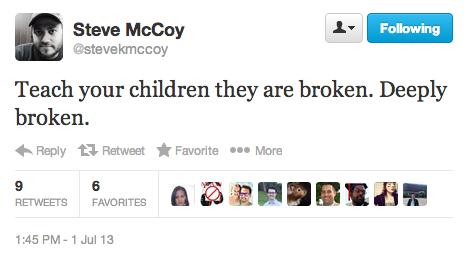Set me as a seal upon your heart, as a seal upon your arm; for love is strong as death, passion fierce as the grave. – Song 8:6
In my mid-twenties, fairly newly married, I became somewhat passionate about the passion in the Song of Songs. My pentecostal/charismatic upbringing either avoided the Song entirely or allegorized it into a lesson on “intimate” prophetic prayer and worship – accompanied, of course, by songs that said things like “take me into your chambers” and “I want to taste the kisses of your mouth” (referring to a spiritual rendezvous with Jesus that wasn’t sexual at all!). But now, having just discovered the, um, act of marriage, the meaning of the Song became OBVIOUS and WONDERFUL: it was the Bible’s great ode to “free and frequent” sexual pleasure within marriage! And there were preachers like Mark Driscoll going through entire sermon series to de-allegorize and re-establish the oh-so-physical sexiness of the Song.
Maybe it’s the fact that I’m now ten years married, older and wiser, or whatever, but I have come to think that this de-allegorizing robs the Song of its real power. Yes, I do think there is a fascinating story about sexual love here that, if nothing else, positively validates the body and sex and romance and all those things. And no, I don’t think it’s a good idea to over-allegorize it and take away it’s first meaning as the mutual joy and pleasure between Solomon and “the wife of his youth.” But with much poetic and prophetic text in the Old Testament there is a second meaning, a meaning beneath the meaning that manifests especially in light of the person and work of the promised Messiah, Jesus.
And the second meaning is where the real power lies.
I stand, then, with the ancient Christian tradition that sees in the Song a metaphor for the passion shared between Christ and the church – not to avoid the physical sexiness of the Song, nor to awkwardly sexualize our spiritual prayer and worship, but rather to depict the strength and degree of union between the human church and the divine Christ by comparing it to this truly great and passionate love poem.
My favorite verse in the poem is in chapter 8, where the Shunamite woman desires to be set as a seal on Solomon’s heart, a seal upon his arm, forever securing their bond of love. “For love,” she says, “is strong as death, passion fierce as the grave.” Whoa.
It would be tragic to miss the echoes of Jesus here, whose covenant love for his people was strong enough to endure the death of the cross, fierce enough to despise the shame all the way to the grave. It would also be tragic to miss the super-fulfillment of the resurrection: that Jesus’s covenant love was so tenacious, so ferocious, so strongly and fiercely righteous, that it could not be held down by death and rose victorious over it. This covenant of love is an eternal seal that not even death can break.
And this brings me to a thought about death with dignity.
Better Than Dignity
We all know that Brittany Maynard, the 29 year old woman with brain cancer who recently chose to legally end her own life through physician-assisted means, described her choice as the choice to die with dignity. And we know that this is the term coined for physician-assisted death in general. The meaning is clearly that horrible terminal illnesses can take us to places of physical pain, torment, and deterioration that seem to take away our very human dignity. This is can hardly be denied.
But to say that horrible terminal illness actually takes away our human dignity, if we forego the physician-assisted option, is obviously a lie.
The Internet has been rife with people moralizing about Brittany Maynard’s choice, calling it heroic and human on one hand, and arrogant and cowardly on the other. Many Christians have taken the latter position, choosing to see the political ramifications of Maynard’s legal choice as contributing to a “culture of death” buoyed by abortion, and now suicide, on demand. The conversation is polarized as per usual, with the points having more to do with the political motivations behind them than the actual human lives involved.
But what if it’s not really about “to die or not to die” at all? What if it’s not really about “with dignity or without dignity” either?
What if the real question we should be asking is “to love or not to love”?
I don’t think Brittany Maynard was a professing Christian, and far be it from me to judge those who are “without.” As far as I can tell, her choice was careful, legal, sensible, and humane. Her affliction was unthinkable; her family’s grief must be unbearable. She merely chose the precise time at which to go to her grave, which was coming for her no matter what, and sooner than later. And, her love for her husband and her family were evident, I’m sure, until the end.
So there is nothing, really, to critique here.
There is much to mourn.
And there is one more thing to say.
As a Christian I believe there is a love fierce as the grave – which triumphed over the grave. I have been sought out by Christ in his strong covenant affection; I am his, and he is mine. In him I have been chosen and sealed until the day of redemption, when our love will become not a temporary but an eternal reality. Knowing this fierce love and this everlasting life causes me to desire to love and to live, for as long as possible, in this present time…and beyond.
This is the hope of the world: that our lives would be ever caught up in this passion, a passion that transcends human relationship and temporal life itself.
A passion that fulfills, super-fulfills, and is indeed far better than death with dignity.











